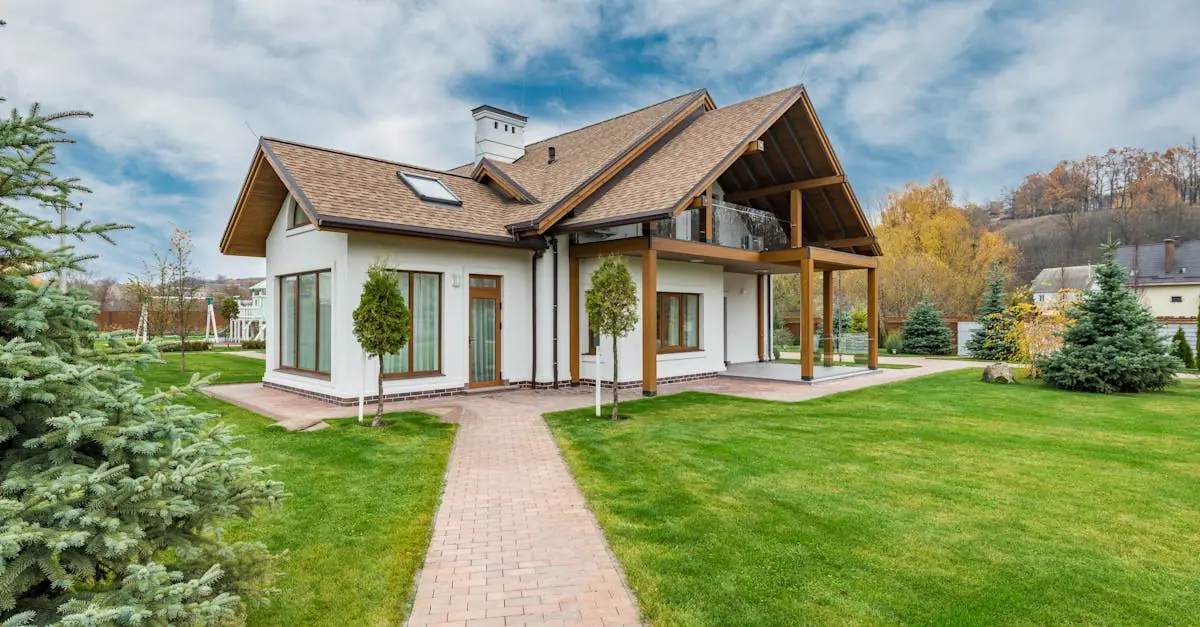In a world where bigger often seems better, small houses are proving that good things come in cozy packages. Whether it’s a tiny cottage or a compact urban apartment, small spaces offer unique charm and endless potential. But let’s face it—living in a pint-sized palace can sometimes feel like a game of Tetris, especially when it comes to renovations.
Table of Contents
ToggleOverview of Small House Renovations
Small house renovations present unique challenges and opportunities for homeowners. Emphasizing aesthetics and functionality becomes essential when space is limited. Expanding storage options, upgrading fixtures, and enhancing curb appeal can create a significant impact.
Consider a few popular renovation strategies for small spaces. Installing built-in furniture saves space while maintaining a stylish appearance. Adding mirrors expands visual space, making rooms feel larger and more open. Repainting with light colors brightens interiors, creating an illusion of more room.
Natural light plays a crucial role in small house renovations. Incorporating skylights or larger windows increases brightness and makes spaces feel inviting. Open floor plans can facilitate movement and connection between areas, eliminating cramped feelings.
Budget constraints often influence renovation decisions. Setting a realistic budget and prioritizing essential updates helps avoid overspending. Finding cost-effective materials, such as laminate flooring or repurposed furniture, keeps expenses manageable.
Consulting professionals can provide insights and save time. Interior designers and contractors offer valuable expertise in maximizing small spaces. Researching local experts ensures homeowners receive quality service and tailored advice.
Sustainable practices frequently integrate into renovation plans. Using eco-friendly materials, like bamboo or recycled products, promotes environmental responsibility. Implementing energy-efficient appliances minimizes utility costs while enhancing home value.
Together, these elements contribute to successful small house renovations, maximizing potential and improving living conditions.
Planning Your Renovation
Effective planning serves as the foundation for successful small house renovations. Thoughtful consideration of budget and material choices significantly impacts overall results.
Budgeting for Small Space Upgrades
Establishing a realistic budget remains crucial for small space renovations. Set clear priorities to direct funds toward essential upgrades. Allocate specific amounts for different areas, such as kitchen, bathroom, and living space enhancements. Consider costs related to labor and permits, which can fluctuate based on local regulations. Research cost-effective materials and options to stretch budgetary limits. Utilize online tools and resources to track expenses and compare prices. Aim to be flexible with financial plans to accommodate unexpected expenses that may arise during the renovation process.
Choosing the Right Materials
Selecting suitable materials enhances both aesthetics and functionality in small house renovations. Opt for lightweight, durable materials that don’t overpower tight spaces. Prioritize eco-friendly options that reflect a commitment to sustainability. Use versatile pieces, such as multi-functional furniture, to optimize utility. Combine textures and colors to create visual interest without cluttering. Evaluate the longevity of materials, focusing on quality over quantity. Matching finishes with the overall design theme adds cohesion to the space. Engage with suppliers to discover innovative materials that maximize efficiency and style.
Popular Renovation Ideas
Small house renovations can transform limited spaces into functional and stylish areas. Homeowners often find inspiration in various renovation strategies tailored to maximize utility.
Kitchen Remodeling Tips
Implementing smart design choices can revitalize kitchens in small houses. Opting for sleek, space-saving appliances enhances functionality while maintaining style. Installing open shelves instead of bulky cabinets promotes accessibility and visual space. A lightweight island can serve as additional workspace or dining area, fostering a multi-purpose environment. Bright, reflective materials can create a sense of openness, while adding natural light through larger windows benefits ambiance. Prioritizing organization through pull-out drawers ensures efficiency in storage, contributing to a neat appearance.
Maximizing Living Space
Creating an illusion of more space remains a prime goal in small house renovations. Utilizing furniture that doubles as storage optimizes utility without overcrowding. Mirrors strategically placed can reflect light and make rooms feel larger. Open floor plans connect spaces, allowing for seamless transitions while cultivating a sense of openness. Choosing lighter paint colors enhances brightness, making rooms feel expansive. Vertical shelving solutions also capitalize on unused wall areas, ensuring efficiency in storing items while keeping floors clear. Adapting layouts to enhance flow fosters a welcoming atmosphere in compact living spaces.
Eco-Friendly Small House Renovations
Eco-friendly renovations enhance small houses while supporting environmental sustainability. Homeowners can make informed choices by focusing on sustainable materials and practices.
Sustainable Materials and Practices
Reclaimed wood offers durability and a unique aesthetic, often sourced from old barns or factories. Bamboo serves as an excellent alternative due to its rapid growth and strength. Additionally, recycled metal can add a modern touch while minimizing waste. Eco-friendly paints, low in volatile organic compounds (VOCs), contribute to better indoor air quality and come in various colors.
Energy-efficient appliances reduce energy consumption and lower utility bills, ensuring long-term savings. Moreover, solar panels enhance energy independence and decrease reliance on non-renewable resources. Choosing local materials minimizes transportation emissions, making a positive environmental impact. Ultimately, prioritizing sustainability in small house renovations not only benefits the planet but also elevates property value.
Working with Professionals vs. DIY
Choosing between professionals and DIY for small house renovations requires careful consideration. Homeowners may benefit from the expertise of professionals like interior designers and contractors who understand the nuances of maximizing limited spaces. Their experience translates into efficient solutions that often save time and reduce costly mistakes.
DIY enthusiasts may find satisfaction in tackling smaller projects themselves. This approach can foster creativity and lead to unique designs reflective of personal style. However, managing complex tasks such as plumbing or electrical work often requires specialized skills and knowledge.
Budget considerations significantly influence this choice. Professional services can be more expensive upfront, but achieving high-quality results might save money in the long run by avoiding remediation work. On the other hand, a DIY project can remain budget-friendly if homeowners already possess tools and skills for simpler tasks.
Time investment also varies between these two paths. DIY renovations demand consistent effort, often extending timelines due to inexperience. Engaging professionals typically expedites the process, especially for projects requiring extensive labor or technical skills.
Risk factors should not be overlooked. DIY projects may invite safety hazards without proper precautions or experience. Professionals possess safety training and industry knowledge necessary to mitigate these risks effectively.
Evaluating goals is critical in deciding on renovation methods. If a project centers around aesthetic upgrades or minor adjustments, a DIY approach may suffice. For major renovations demanding structural changes, professional guidance is ideal to ensure compliance with building codes and safety standards.
Ultimately, the decision combines personal strengths, budget constraints, and project complexity. It’s essential to weigh these factors to achieve the desired outcome in small house renovations.
Small house renovations offer a unique blend of challenges and opportunities. By focusing on aesthetics and functionality, homeowners can transform limited spaces into stylish and efficient environments. Embracing sustainable practices not only enhances the home’s value but also contributes positively to the planet.
Whether opting for professional help or taking on DIY projects, careful planning and budget management are essential for success. With the right strategies and materials, small homes can reflect personal style while maximizing every inch of space. Ultimately, thoughtful renovations can lead to a more comfortable and inviting living experience.



